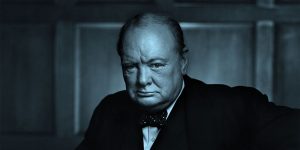
Affiliate and Chapter Events
2022 APSA Churchill Black Tie Dinner

16 September 2022
Friday, September 16, 2022 | Montreal, Quebec
The International Churchill Society’s annual black tie Academic Dinner will be held at the St. James Club, 1145 Union Ave, Montreal, Quebec H3B 3C2, Canada on the evening of Friday, September 16, 2022. This year we are honored to have James W. Muller, Professor of Political Science at the University of Alaska, Anchorage, and Chairman of the ICS Board of Academic Advisers, as our after-dinner speaker. Professor Muller has published a number of books by and about Winston Churchill, including new editions of the statesman’s interwar essays Thoughts and Adventures and Great Contemporaries, and of his early book The River War: An Historical Account of the Reconquest of the Soudan, in two volumes. He will be speaking about his latest project, a new edition of Churchill’s most approachable and most charming book, My Early Life: A Roving Commission, first published in 1930 and never out of print since then. Churchill’s autobiography gives the reader a window into his soul and offers the best introduction to his character. What was his intention in writing it? What can we learn from reading it? How far can we rely on its truth?
The evening will begin with a cash bar reception, followed by dinner and remarks after dinner. Dinner dress is black tie or dark suit. The reception will begin at 7:00 p.m.; dinner will begin at 7:30 p.m.
The International Churchill Society organizes the dinner each year in conjunction with the annual meeting of the American Political Science Association. The Society was founded in 1968 under the patronage of the late Lady Soames LG DBE (1984–2014) and has about 3,000 members worldwide. An international nonprofit organization, the Society encourages the study of Winston S. Churchill’s life and thought and strives to keep his memory alive for future generations.
Dinner subscriptions are $100 USD or $130 CAN per person. You may also register by phone, e-mail, or fax. Payment may be made by American Express, Discover, MasterCard, Visa, or PayPal.

2025 International Churchill Conference
The International Churchill Society Academic Panel at the APSA Annual Meeting in Montreal
Date: Friday, September 16, 2022
Time: 2:00 p.m. to 3:30 p.m.
You are also warmly invited to join us in the afternoon on the same day as the academic dinner for the 24th annual academic panel organized by the International Churchill Society as a related group of the American Political Science Association at its annual meeting in Montreal. Look for our next message giving the location of the panel, when it has been announced by the APSA.
Academic Panel Discussion
“Winston S. Churchill, Britain’s Foreign Policy, and International Relations”
Throughout his long political career, Winston S. Churchill helped to guide Britain’s relations with other countries as he worked to uphold British preeminence and forestall threats to British independence. This panel investigates his role in making Britain’s foreign policy in several crucial cases.
Panel Chair: Yvonne Chiu, Naval War College
Papers will be presented by the following professors:
(1) Eric Goldstein, Boston University: “Churchill and Britain’s Plan for an Eastern Mediterranean Empire, 1916–22”
At the end of the Great War, Britain entertained plans for a vast new eastern Mediterranean empire, far larger than what it ultimately acquired. Its diplomatic strategy can be fully understood only in the light of its original objectives in the eastern Mediterranean, stretching from the Gallipoli campaign of 1915 to the Chanak crisis of 1922 and the fall of the Lloyd George coalition. Throughout this period Winston Churchill was a central figure, and this paper will consider Churchill’s role in shaping Britain’s imperial grand strategy as successor to the Ottoman Empire in the eastern Mediterranean.
(2) John Maurer, Naval War College: “‘Forced into the Shade’: Winston Churchill and the American Naval Challenge”
The United States emerged as a naval competitor of Great Britain after the First World War. American naval ambitions exasperated the British statesman Winston Churchill, who saw this challenge threatening Britain’s position as the world’s leading sea power. Faced by America’s growing economy and navy, Churchill lamented Britain’s decline as a world power. He confided to his wife Clementine: “Poor old England—she is being slowly but surely forced into the shade.” Despite America’s undoubted economic strength, Churchill was determined that Britain should stay ahead of the United States in the naval arms race.
My paper examines Churchill’s views about America’s growing naval power and Britain’s ability to compete against the United States. Examining Churchill’s views in this period provides an opportunity to explore the question of how the leading world power responded to a rising international great-power challenger. How did Churchill assess American foreign policy aims and ability to achieve them? How did he think Britain could win the naval arms race when the United States possessed a much stronger economy? Did he consider war between Britain and the United States as “unthinkable”? Or did Churchill fear that the international ambitions of the two countries made them destined for war? Examining these questions can shed light on fundamental problems in the study of international relations.
(3) Gaynor Johnson, University of Kent: “Sir Austen Chamberlain, Churchill, and Conservative Party British Foreign Policy”
This paper explores three issues. First, it contrasts the personal and political relationship between two of the most influential and controversial members of the British Conservative party in the interwar period, Sir Austen Chamberlain and Winston Churchill. Second, and as a case study of this relationship, it examines their views on the growing international crisis that resulted in the outbreak of the Second World War in 1939. Both agreed that Germany posed the principal threat to European peace, but for very different reasons. Third, this paper offers an interpretation of a relationship hitherto overlooked by historians. The details of Churchill’s encounters with Neville Chamberlain are very well known and have been very closely documented, and for good reason. Yet it was Neville’s elder half-brother Austen who had been groomed by their father for high office, and he was indeed an influential leader of the Conservative Party in the late Edwardian period and arguably the most important British Foreign Secretary of the 1920s.
Panel Discussant: Marc A. Genest, Naval War College
The panel discussion will be held on Friday, September 16, 2022 from 2:00 p.m. to 3:30 p.m. in a location soon to be announced. This program is open to ALL interested parties, whether or not you belong to the APSA.
Subscribe
WANT MORE?
Get the Churchill Bulletin delivered to your inbox once a month.



